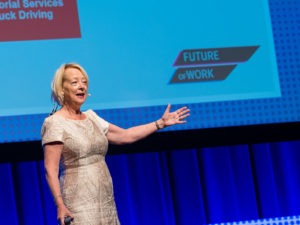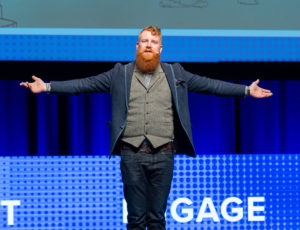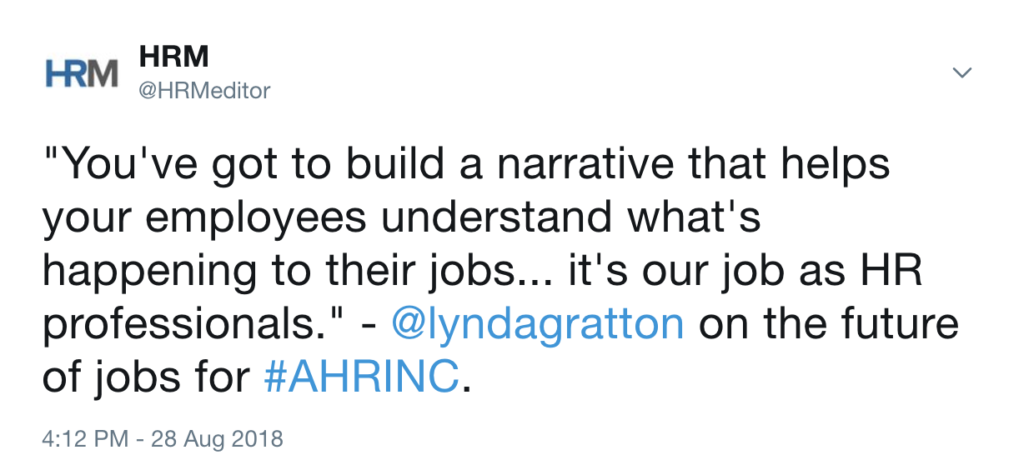Never stop learning. That’s the clear message filtering through from the experts at this year’s AHRI National Convention. If you do stop, you risk being left behind.
With the current workforce predicted to continue working into their 70s and 80s, professor of management practice at London Business School Lynda Gratton is passionate about helping employers to effectively utilise their multi-generational talent pool by encouraging a new approach to people management. The key, not just for older workers, is lifelong learning.
Future jobs will no doubt be tech-heavy and innovation focussed, but as Gratton pointed out as part of her keynote address, that shouldn’t exclude a talented and experienced chunk of your workforce.

Gratton says that at the London Business School they have banned the use of categorical language when talking about different generations – millennials, baby boomers, gen X etc. – she says there’s no evidence that shows that these generational cohorts need to be divided, “it just leads to age stereotypes”.
From new grads to great grandmothers
Tim Reed, CEO of MYOB, is another speaker who believes that age is no barrier. In fact, he sees a huge amount of potential in his older workforce. “Knowledge is key in our business, and it’s built over time, so people who’ve been with us for a long period are some of our most precious resources,” he says speaking with HRM.
“Strengths and skills change as we mature. We need to ensure we’re offering the right amount of flexibility to enable employers at different stages of life to contribute constructively,” he says.
Reed mentioned a great grandmother working in the MYOB team who he believes has continued to thrive in the organisation because she has never stopped educating herself.
“It’s important for every industry, but you’re dead in tech if you’re not constantly learning.”
Delegate Laura Sayers CPHR, from ANU, says that one of her main focuses at the moment is providing professional development opportunities for her team.
“I make sure they continue doing things. That might be something small or getting a larger qualification; anything that keeps them in the habit of learning. We have a lot of training opportunities available and I really encourage my staff to do as much as possible.”
Skate to where the puck is going to be
Our modern age is often compared with the industrial revolution. Back then there was massive job destruction and workers weren’t able to look into the future to see the plethora of new job opportunities that would soon become available to them – a horse and cart driver couldn’t foresee working with cars, be it making, selling or driving them. Gratton said that the same thing will happen now, the difference being that we have the power of hindsight to recognise the opportunities at our fingertips.
Referring to a hockey game, Reed said it’s about skating to where the puck will be. Business leaders need to harness their foresight to identify the skills-gaps that could occur five years down the track and work on training their existing people now. This way employers can avoid finding themselves in NAB’s position; forced to axe thousands of employees, even as they have to hire 2,000 new staff with different skills.
He touches on the fear surrounding the automation of the workforce saying: “AI isn’t going to replace an accountant, an accountant who uses AI will replace an accountant who doesn’t use it.”
Motivation expert Jason Fox echoed this point in his keynote address. “It won’t be technology disrupting your business, it will be other people using technology better that will disrupt it.”
Think about learning differently
While it’s important to keep your finger on the pulse and ensure you’re always looking into the distance for the next set of challenges, Fox said we should also be cautious about goals. They might be important 80 per cent of the time, but they can stifle true progress.

“[Goals] narrow our focus. If they are incentivised, they can encourage unethical behaviour. It’s not that goal setting doesn’t work, it’s that it doesn’t work well. They should be treated as prescription medicine.”
He believes nurturing a new way of thinking is an incredibly valuable commodity and that we should be looking to each other not just as people, but as resources – what can we learn from one another?
Human emotional intelligence, and our craving to be active learners and think critically, are what make us so valuable, says Gratton. It was something CIPD CEO Peter Cheese echoed in his rousing keynote. “I can’t predict what the jobs of the future are, nobody can. What we need to do is have a stronger focus on what the core and transferable skills are. This I can tell you. Human skills, social skills.”
As the leader of a huge HR association, he called on the profession to invest in itself with lifelong learning and certification. “We worry about the learning of development of others, but we forget about ourselves.
“This is a fantastic time for HR. It’s a huge responsibility we face in the future of work. Putting people at the centre of business thinking – that is what we do. What a purposeful profession we can be.”
What does your organisation do to encourage a culture of continuous learning? Share your thoughts in the comments below.
Discover new ways of learning and people management at Australia’s largest HR exhibition – a part of the AHRI National Convention and Exhibition at the Melbourne Convention and Exhibition Centre. Free exhibition entry on the last day Thursday 30 August.



[…] the next goal post, the latter is far easier to achieve after some degree of reflection and learning has taken […]